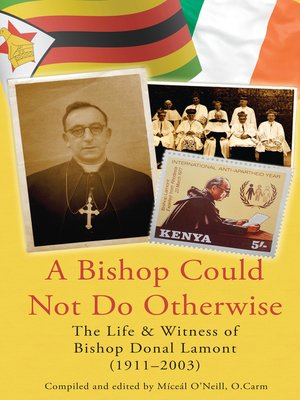A Bishop Could Not Do Otherwise
ebook ∣ The Life & Witness of Bishop Donal Lamont (1911-2003)
By Donal Lamont

Sign up to save your library
With an OverDrive account, you can save your favorite libraries for at-a-glance information about availability. Find out more about OverDrive accounts.
Find this title in Libby, the library reading app by OverDrive.



Search for a digital library with this title
Title found at these libraries:
| Library Name | Distance |
|---|---|
| Loading... |
An intimate view of the man who became a champion of human rights, the voice of the marginalised people of Zimbabwe, the friend of Pope Paul VI, the voice of mission at the Second Vatican Council, a nominee for the Nobel Peace Prize, and the pastor who knew well the 'wolves in sheep's clothing'. Bishop Donal Lamont was a man who was driven by a very strong sense of responsibility, summed up in words that he wrote in his most noted pastoral letter, Purchased People (1959), 'Preach the Bishop must; not permitting himself to be silenced by merely human fears or temporal considerations. ' He did not curry favour and he did not back off; so it was in his life as a Carmelite friar, as a missionary priest in Southern Rhodesia, as a bishop at the Second Vatican Council, and as a Church leader in Zimbabwe during the time that Ian Smith was in power. Some of the story of this remarkable man is told here, partly in his own words and partly by two Spanish theologians, Fernando Millán and Carmen Márquez Beunza, both of the Pontifical University of Comillas in Madrid. In her foreword, Mary McAleese, former President of Ireland, declares that the legacy of this man deserves to be recognised and present generations deserve the memory of that legacy. In her concluding remarks, Carmen Márquez Beunza writes: 'That short pastoral letter with the title, Purchased People that an Irish Carmelite bishop wrote when Martin Luther King was marching through the dusty streets of Alabama demanding the integration of black people in the United States of America, is a very important document for all who wish to learn the history of the Catholic Church and the racial question. '







